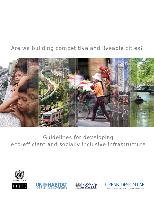Location
The Economic and Social Commission for Asia and the Pacific (UNESCAP or ESCAP) is one of the five regional commissions of the United Nations Economic and Social Council, under the administrative direction of the United Nations headquarters. It was established in 1947 (then as the UN Economic Commission for Asia and the Far East, ECAFE) to encourage economic cooperation among its member states. The name was changed to the current in 1974. ESCAP has 53 member States and nine Associate members, home to more than two-third of the world population. As well as countries in Asia and the Pacific, it includes France, the Netherlands, the United Kingdom and the United States.
ESCAP's regional focus is managing globalization through programs in environmentally sustainable development, trade, and human rights.
Members:
Resources
Displaying 1 - 5 of 6Are we building competitive and liveable cities?: Guidelines for developing eco-efficient and socially inclusive infrastructure
This guideline jointly published by The UN Economic and Social Commission for Asia and the Pacific (ESCAP), the UN Economic Commission for Latin America and the Caribbean (ECLAC), and the UN Human Settlements Programme (UN-HABITAT), in partnership with the Urban Design Lab of the Earth Institute, Columbia University, provides practical tools for city planners and decision makers to reform urban planning and infrastructure design according to the principles of eco-efficiency and social inclusiveness.
Are we building competitive and liveable cities?: Guidelines for developing eco-efficient and socially inclusive infrastructure
This guideline jointly published by The UN Economic and Social Commission for Asia and the Pacific (ESCAP), the UN Economic Commission for Latin America and the Caribbean (ECLAC), and the UN Human Settlements Programme (UN-HABITAT), in partnership with the Urban Design Lab of the Earth Institute, Columbia University, provides practical tools for city planners and decision makers to reform urban planning and infrastructure design according to the principles of eco-efficiency and social inclusiveness.
Are we building competitive and liveable cities?: Guidelines for developing eco-efficient and socially inclusive infrastructure
This guideline jointly published by The UN Economic and Social Commission for Asia and the Pacific (ESCAP), the UN Economic Commission for Latin America and the Caribbean (ECLAC), and the UN Human Settlements Programme (UN-HABITAT), in partnership with the Urban Design Lab of the Earth Institute, Columbia University, provides practical tools for city planners and decision makers to reform urban planning and infrastructure design according to the principles of eco-efficiency and social inclusiveness.
Are we building competitive and liveable cities?: Guidelines for developing eco-efficient and socially inclusive infrastructure
This guideline jointly published by The UN Economic and Social Commission for Asia and the Pacific (ESCAP), the UN Economic Commission for Latin America and the Caribbean (ECLAC), and the UN Human Settlements Programme (UN-HABITAT), in partnership with the Urban Design Lab of the Earth Institute, Columbia University, provides practical tools for city planners and decision makers to reform urban planning and infrastructure design according to the principles of eco-efficiency and social inclusiveness.
Food Security and Natural Disasters: [Myanmar] Country Status Paper
Myanmar has a total land area of 676,577 sq km with a population of 57.50 million. Total net sown area is 11.67 ml ha with the cropping intensity of 157.1%. Forest cover, 33.44 ml ha accounted for nearly half of Myanmar's land area. Presently, only 60% of the 17.19 ml ha classified for agricultural production is being exploited.
Myanmar has a predominantly agricultural economy and agriculture sector contributed 45% of GDP, 11% of export earning and employed 63% of its labour force...



